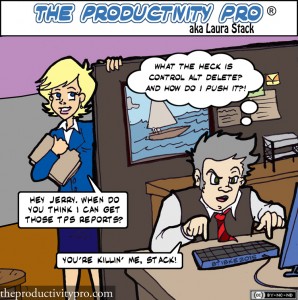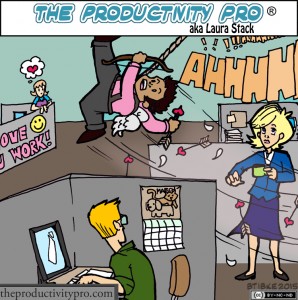Laura Stack, The Productivity Pro, discusses how to get to solutions instead of wasting time playing the blame game. (C) 2015 Laura Stack, All Rights Reserved. www.TheProductivityPro.com … [Read more...]
Yes Men, No Men: Dealing With the “Autonegatives” at Work

Do you have a coworker who says "no" to your ideas before he or she has given them a decent hearing? For whatever reason, some individuals always have to say "no" before they can see clear to even considering something new. These “no men” (gender neutral) are more annoying and useless, at least in the short term, than “yes men”—and that's really saying something. I call them "autonegatives." These people love to criticize and tear down ideas before they’ve given them any real thought. Autonegatives live everywhere in life. Some may be masquerading as your friends or family. Sometimes you run into them in shops (though the smart manager doesn't leave them in place long). At work, the fiefdom builders and information hoarders tend to be autonegatives, some because they like the tiny … [Read more...]
That Sense of Belonging: A Teamwork Necessity

"A deep sense of love and belonging is an irreducible need of all people."-- Brené Brown, American author We all want to belong, whether it's as part of a marriage, a family, a social club, a political party, a community, a nation, or some combination of the above. The best workplace teams also provide a sense of belonging. Well-established work processes, mutual respect, a deep sense of familiarity, and a commitment to group decisions and actions can all contribute to greater productivity. Perhaps most importantly, productive teams develop and live by a series of team norms. These represent the "rules" all team members work under, based on group consensus. They don't have to be unanimous; but like most group decisions, everyone lives by them for the good of the whole. The Evolution … [Read more...]
Too Gung Ho: When Does Initiative Cross the Line?

"Employers and business leaders need people who can think for themselves -- who can take initiative and be the solution to problems." -- Steven Covey, American business writer. While I’ve always stressed the importance of taking initiative and owning your job, I'll bet there have been times when you've faced trouble for trying to do just that. Most managers and authority figures say they want initiative, and the majority really do. But the fact remains: some aren't as keen about it as they claim—especially when you color outside the lines. If you take too much initiative, you can become a bother, break their process, or run afoul of micromanagers. Ultimately, how much initiative you should take at work depends on a number of factors. So before you weigh in on something or just jump … [Read more...]
Does Your Team Get Along Too Well? Don’t Hesitate to Disagree!

You’ve probably been a member of a team before where everyone automatically agrees about everything. Typically, one person forcefully dominates such teams, to the point where it's easiest to go along with what that person decides just to avoid conflict. But anyone who rubberstamps team decisions is guilty of bad team membership, because this kind of groupthink kills initiative, hurts engagement, and damages productivity. Live Wire or Dead Battery? I'd never recommend that team members go at each other hammer-and-tongs, but a certain level of conflict is healthy. Saying, "I don't think that's our best course of action, and here’s why” is desirable. Even geniuses like Einstein aren't always right. Einstein fought quantum theory at first, but 100 years later it's the best-tested … [Read more...]
Ensuring Remote Productivity: How to Work Effectively With People Who Aren’t Sitting Right Next to You

"Quality means doing it right even when no one is looking." -- Henry Ford, American automaker. A lot of what we used to know about working with others changes when our coworkers sit 10,000 miles away, instead of 10 feet away. Today we have to add “working with remote colleagues” to our basic skill set, whether that involves an outsourced contractor, a headquarters or field office in another country, those working in home offices, or a colleague temporarily transferred. And here's the kicker: ensuring remote productivity isn't just the responsibility of the team leader. Everyone owns responsibility for it. So what can you do to ensure you and your remote coworkers stay jointly productive? Aside from the things you'd do with any other coworker, you can try these measures: 1. … [Read more...]
Unexpected Consequences: Are You Ruining Your Team’s Productivity?

When it comes to poor productivity, the guiltiest party is often the last person to know—because no one tells them. Sometimes it's because their coworkers don't want to cause trouble or get in an argument. Other times they work around the unproductive teammate, because it's easier that way. What if you're the one guilty of ruining your team's productivity, and you don't realize it? It’s kind of like having broccoli in your teeth—you wish someone would tell you, before you embarrass yourself. Though other factors may contribute, as Patrick Lencioni points out in his book The 5 Dysfunctions of a Team, it ultimately boils down to an absence of trust. In Lencioni's fable, the person doing this most was a brilliant marketing VP named Mikey. She rolled her eyes at her executive team's ideas, … [Read more...]
Beyond the Grind: Helping Your People Love Their Jobs

We've all heard about the fun perks that progressive employers like Google and Yahoo! offered their employees until recently—great social activities, play areas, telecommuting options, free bikes to ride around campus, and the opportunity to spend a fair portion of their work time on projects of their own choosing. This has begun to change as more traditional-minded CEOs come on board, to the apparent chagrin of many. There are other ways to make people look forward to coming to work, without risking that complacency can take hold. Loving a job in a productive way has a lot to do with ownership. Engaged workers own their jobs. They're willing to give their discretionary time to their work. This can only happen when people are proud of where they work, whom they work for, and what they … [Read more...]



